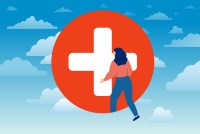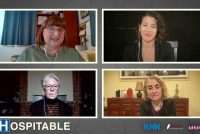Latest Morning Briefing Stories
Cómo el optimismo puede cerrar la brecha de cobertura de Medicaid
Más de 2 millones de personas de bajos ingresos, la mitad de ellos en Florida y Texas, no tienen seguro porque están atrapados en una brecha de cobertura. Y sus estados no han expandido Medicaid.
How Optimism Can Close the Medicaid Coverage Gap
Low-income residents in states that haven’t expanded Medicaid are in a tough spot: They don’t qualify for the subsidies that people with slightly higher incomes get to buy marketplace plans because of a glitch in the federal health law. But a court decision last year makes it easier for them to make good-faith estimates of a pay increase, and there is no financial penalty if they don’t hit that figure.
Watch: As Health Costs Spike, the Role of Hospitals Often Gets Overlooked
A new documentary, “InHospitable,” explores how disputes between big hospitals can leave patients with few options for care and imperil their health.
Medicare Plan Finder Likely Won’t Note New $35 Cap on Out-of-Pocket Insulin Costs
In August, Congress approved a $35 cap on what seniors will pay for insulin, but that change came too late to add to the online tool that helps Medicare beneficiaries compare dozens of drug and medical plans. Federal officials say beneficiaries who use insulin will have the opportunity to switch plans after open enrollment ends Dec. 7.
California acumula multas de residentes sin seguro en lugar de reducir los costos de la atención
Se suponía que los ingresos por estas multas ayudarían a financiar los subsidios estatales para los californianos de ingresos medios y bajos que compran cobertura a través de Covered California.
Private equity firms have shelled out almost $1 trillion to acquire nearly 8,000 health care businesses, in deals almost always hidden from federal regulators. The result: higher prices, lawsuits, and complaints about care.
California Stockpiles Penalties From Uninsured Residents Instead of Lowering Care Costs
California is collecting hundreds of millions of dollars a year in tax penalties from uninsured residents. The state was supposed to use the money to help lower costs for Californians who couldn’t afford insurance but hasn’t distributed any of the revenue it has collected — citing uncertain economic times.
‘An Arm and a Leg’: No Money, No Job, No Health Care? Not Always.
For many Americans, it’s open enrollment season for 2023 health insurance. One listener asked: If you don’t have a job and are too old to be on your parents’ plan, does it make sense to rely on charity care? This episode breaks it all down.
Journalists Tackle the Midterms and Open Enrollment
KHN and California Healthline staff made the rounds on national and local media this week to discuss their stories. Here’s a collection of their appearances.
El tema del aborto ayuda a los demócratas a minimizar pérdidas en estas elecciones
Entre otros problemas que enfrentaron los votantes el martes, los residentes de Dakota del Sur aprobaron una expansión de Medicaid bajo la Ley de Cuidado de Salud a Bajo Precio.
Abortion Issue Helps Limit Democrats’ Losses in Midterms
Although control of Congress was still undecided Wednesday, Republicans seemed poised to take power in the House, while the fate of the Senate remained too close to call. Economic issues were at the top of voters’ minds, but abortion access also played a large role in their decisions.
Defense Department Health Plan Cuts Its Pharmacy Network by Nearly 15,000 Outlets
Many of the pharmacies were small, independent operations that had decided not to participate next year because of the lowered reimbursement being offered. But they were surprised by an early dismissal, and some patients with specialized drug needs could face difficulties in the transition.
Hospital Giant HCA Fends Off Accusations of Questionable Inpatient Admissions
The nation’s largest private health system, HCA Healthcare, has faced years of scrutiny over its share of emergency room patients who are admitted to the hospital. And now U.S. Rep. Bill Pascrell, a Democrat from New Jersey, is calling for a federal investigation, prompting an escalating defense by the hospital system, based in Nashville, Tennessee.
Centene Showers Politicians With Millions as It Courts Contracts and Settles Overbilling Allegations
Centene, the largest Medicaid managed-care company in the U.S., has thrown more than $26.9 million at political campaigns across the country since 2015, especially focused on states where it is wooing Medicaid contracts and settling accusations that it overbilled taxpayers. Among its tactics: Centene is skirting contribution limits by giving to candidates through its many subsidiaries.
KHN’s ‘What the Health?’: ACA Open Enrollment Without the Drama
The Affordable Care Act’s 10th annual open-enrollment period began Nov. 1 and runs through Jan. 15, 2023, in most states. But for the first time, the health law seems to be enrolling Americans with far less controversy than in previous years. Meanwhile, as Election Day approaches, Democrats are focusing on GOP efforts to cut Social Security and Medicare. Joanne Kenen of the Johns Hopkins Bloomberg School of Public Health and Politico, Tami Luhby of CNN, and Julie Appleby of KHN join KHN’s Julie Rovner to discuss these topics and more. Also this week, Rovner interviews KHN’s Arthur Allen, who wrote the latest KNH-NPR Bill of the Month, about an old but still very expensive cancer drug.
Cash for Colonoscopies: Colorado Tries to Lower Health Costs Through Incentives
State employees could receive checks ranging from $50 to thousands of dollars if they choose the right provider.
This Open Enrollment Season, Look Out for Health Insurance That Seems Too Good to Be True
Complaints about misleading health insurance marketing are soaring. State insurance commissioners are taking notice. They’ve created a shared internal database to monitor questionable business practices, and, in the future, they hope to provide a public-facing resource for consumers. In the meantime, consumers should shop wisely as open enrollment season begins.
¿Comprando seguro de salud de ACA? Aquí, lo nuevo de este año
Comprar ahora significa tener cobertura vigente a partir del 1o de enero de 2023. Aunque gran parte de los planes permanecen iguales año tras año , hay algunos cambios que los consumidores deben tener en cuenta.
Shopping for ACA Health Insurance? Here’s What’s New This Year
Consumers may find relief in some key changes made by Congress and the Biden administration, although other issues remain unsettled.
Readers Boo Medical Debt and Viral Threats in Winning Halloween Haikus
We unmask the winner and runners-up in KHN’s fourth annual Halloween haiku competition — plus the original artwork they inspired as a special treat.






















